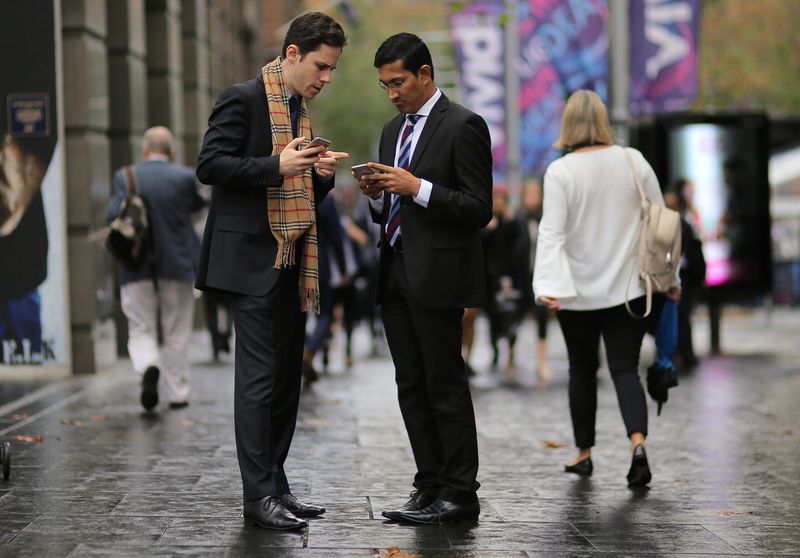Australia jobs jump again, heaping pressure on RBA
2023.07.19 23:10

© Reuters. FILE PHOTO: Businessmen use their phones as they stand in the central business district (CBD) of Sydney in Australia, May 14, 2017. Picture taken May 14, 2017. REUTERS/Steven Saphore
SYDNEY (Reuters) -Australia employment handily beat expectations for a second straight month in June, while the jobless rate stayed near 50-year lows in a sign the labour market remained drum-tight, adding to the risk of further interest rate hikes.
Figures from the Australian Bureau of Statistics showed net employment rose by 32,600 in June from May, when it had surged by a startlingly strong 76,600. Market forecasts had been for an increase of 15,000.
The jobless rate held at a downwardly revised 3.5%, when analysts had expected 3.6%, leaving it just above the 3.4% trough from October last year.
The Australian dollar rose 0.9% to $0.6830, reversing a four-session losing streak, while three-year bond futures fell 12 ticks to 96.1.
Markets moved to priced in a 42% probability that the Reserve Bank of Australia (RBA) would resume hiking rates in August, compared with 35% before the jobs data. The projected peak for rates also rose to 4.42%, from 4.35%.
The labour market has been defying expectations for a slowdown even though the RBA has lifted interest rates by 400 basis points to an 11-year high of 4.1% in just 14 months, suggesting more work may be needed to lower inflation.
Incoming RBA Governor Michele Bullock has said the jobless rate would need to rise to about 4.5% to curb inflation.
Tony Sycamore, a market analyst at IG, said the red-hot job figures would add to the RBA’s unease about a tight labour market and sticky inflation.
“The hotter-than-expected jobs numbers… leave no room whatsoever for an upside surprise in next Wednesday’s Q2 CPI data. More so given the RBA’s stated concerns around wage growth and inflation.”
Marcel Thieliant, an economist at Capital Economics, said after the jobs report he was sticking with his forecast the RBA would have to deliver two more quarter-point rate hikes in this tightening cycle.
The board has flagged the August decision would be based on the second-quarter inflation data, the jobs report, retail sales as well as updated economic forecasts and a revised assessment of the risks.
Full-time employment rose 39,300 in June, on top of a strong 62,900 in May, while participation rate held near its record high at 66.8%, data showed.
However, pressure on the RBA to keep pace with its overseas counterparts on rate hikes has eased somewhat in recent weeks.
Markets expect the Federal Reserve will be done tightening after delivering a final hike later this month, the European Central Bank is less certain about the prospects of two more hikes and the Bank of England will get some relief after British inflation figures surprised to the downside.








